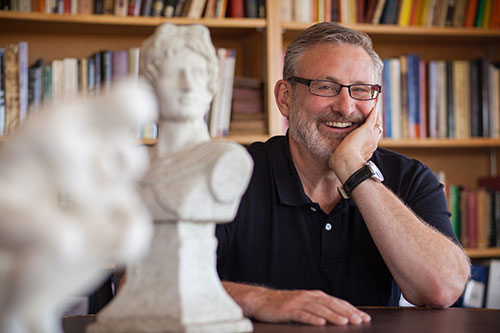This event is from the archives of The Notice Board. The event has already taken place and the information contained in this post may no longer be relevant or accurate.

September 24, 2015 | 7 – 9 p.m.
City Hall, 910 4th Avenue South, Lethbridge
This event is free. Everyone is welcome, and there is no need to RSVP. Seating is limited, however, so arrive early! Appetizers and bar service will be available.
Join U of L Faculty of Arts & Science Dean & professor of history Dr. Craig Cooper as he explores:
Catching the Crook in Classical Athens
Athens was the world’s first democracy; at the heart of the democracy and in many ways what defined it was their approach to administration of justice, which was fully within the hands of citizens, who vetted all magistrates before they entered office, presided over the audit of their accounts at the end of their year in office, and who served as both judges and jurors over all civil and criminal cases that came to court.
At the beginning of each year 6000 citizens were randomly selected by lot to serve a dikasts (jurors and judges) for that year. From this 6000, large jury panels of 200 or more, who were randomly selected each day the courts were in session, would decide questions of fact and law presented to them. Magistrates, who were annually selected by lot from the citizen body, would preside over the judicial process leading up to and including the trial.
In antiquity the Athenians had the reputation for being extremely litigious, partly, I think, because their judicial system was seen as a fundamental aspect of their democracy; all citizens were equal before the law, and so should be judged by their fellow citizens. Athenians believed that what marked their government out from other, narrower forms of government, like Sparta, was their inherent respect for the rule of law.
There is a debate among scholars about whether Athenians, though they ideologically and rhetorically espoused the rule of law, actually upheld the notion or put it into practice or whether the courts were essentially an arena to carry out private feuds. I fall somewhere between these two extreme views, and accept that there was social dynamics that played out in the judicial process and in the courts, but the players, both the litigants and judges respected the law, even though legalities could at times be stretched to the limits.
My question, I would like to explore in this presentation: in a society where there was no organized and formal enforcement agency, such as a police force, or professional lawyers or judges, how did an individual seek legal redress? And what were the social dynamics that came into play as that individual sought legal restitution for a wrong committed against them.
Learn more about the PUBlic Professor Series, visit:
ulethbridge.ca/artsci/publicprofessor
Upcoming Talk Dates & Details
Our speakers have been confirmed and the dates have been set. Talk titles and additional details will be finalized in the coming months. Sign-up for our mailing list and never miss a thing.
22-Oct-15 | Olga Kovalchuk
Epigenetics of Health and Disease
19-Nov-15 | Craig Coburn
Understanding the Complexities of Imaging the Earth: The Challenge of Image Calibration
26-Nov-15 | Jennifer Copeland
Physical Activity Versus Sedentary Time and How They Interact to Affect Health
21-Jan-16 | Harold Jansen
The Impact of Digital Technology on Democratic Citizenship in Canada
25-Feb-16 | Shawn Bubel
Prehistoric Bison Hunters in Southern Alberta: Excavations at the Fincastle Site
17-Mar-16 | Reg Bibby
Beyond the Gods & Back: The Return of Religion in Canada
Contact:
Catharine Reader | catharine.reader@uleth.ca | (403) 382-7154 | uleth.ca/artsci/publicprofessor